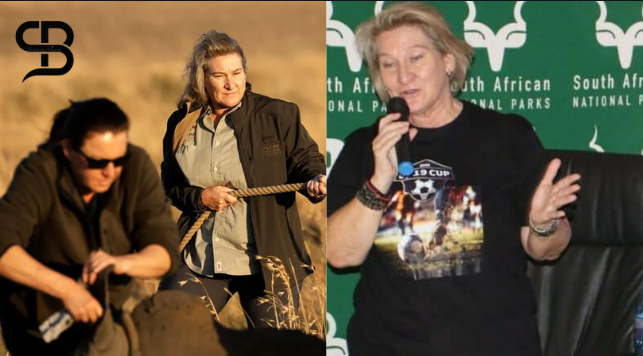Sharon Haussmann Age: Tribe, Net Worth, Husband & Legacy
Not all heroes wear capes—some wear khaki, carry radios, and walk alongside rhinos. Sharon Haussmann, a name synonymous with courage and conservation in South Africa, was one such hero. Known for her fierce determination and heart of gold, Sharon’s legacy goes far beyond boardrooms and titles.
As the CEO of the Greater Kruger Environmental Protection Foundation (GKEPF) and Chairperson of Balule Private Nature Reserve, Sharon led some of Africa’s most ambitious conservation projects. Let’s honor her story, explore her remarkable life, and reflect on the impact she made in just 45 years.
Sharon Haussmann Biography
| Field | Details |
|---|---|
| Full Name | Sharon Haussmann |
| Age | 45 |
| Profession | Conservationist, CEO, Scientist |
| Organization | Greater Kruger Environmental Protection Foundation (GKEPF) |
| Other Roles | Chairperson, Balule Private Nature Reserve |
| Known For | Anti-poaching strategies, rhino rewilding |
| Tribe | Not publicly disclosed |
| Net Worth | Not publicly disclosed |
| Family/Marital Status | Not publicly disclosed |
Who Was Sharon Haussmann?
Sharon Haussmann wasn’t just a conservationist—she was a leader, a visionary, and a fierce protector of wildlife. Her life was a powerful blend of science, leadership, and unwavering compassion for the natural world.
Early Life and Passion for Wildlife
Though her early background remains private, Sharon’s life path was clearly influenced by a deep love for nature. Her fascination with wildlife wasn’t just a hobby—it became her life’s mission, rooted in hands-on research and driven by purpose.
Scientific Achievements and Hyena Research
Many remember Sharon for her executive leadership, but few know that she was also a committed field researcher. She logged over 3,000 hours observing hyenas, one of Africa’s most misunderstood predators. Her work led to the publication of two scientific papers, demonstrating her credibility not just as a leader, but also as a scientist.
Leadership at GKEPF
As the CEO of the Greater Kruger Environmental Protection Foundation, Sharon spearheaded initiatives that united public and private stakeholders to combat poaching. Under her guidance, GKEPF became a central force in defending one of the world’s most threatened ecosystems.
Chairperson of Balule Private Nature Reserve
In her role as Chairperson of the Balule Private Nature Reserve, Sharon helped strengthen cooperation across Kruger’s borders. Her leadership wasn’t just about conservation—it was about creating communities of care, resilience, and accountability.
Anti-Poaching and Wildlife Protection Work
Sharon believed in action. From securing anti-poaching technologies to building on-the-ground collaboration, she was deeply involved in frontline defense of endangered species. Her strategies influenced how South Africa fights illegal wildlife trade today.
The Rhino Rewild Initiative
One of Sharon’s most remarkable achievements was her role in the African Parks’ Rhino Rewild Initiative. Working to relocate 120 southern white rhinos back into the wild, she helped orchestrate one of the largest conservation projects of our time. It was a feat of vision, logistics, and passion.
Awards and Recognition
Sharon’s excellence didn’t go unnoticed. In 2004, she was named South Africa’s Female Farmer of the Year, a nod to her commitment to land stewardship and sustainable practices long before her conservation fame.
Mentorship and Support for Safari Guides
Sharon didn’t just support wildlife—she championed the people protecting it. As a key early supporter of the Safari Guide of the Year competition, she personally provided finalists with gear and apparel, long before major sponsors stepped in. She believed in building people, not just systems.
Personal Life and Family
While Sharon kept her personal life and husband out of the public eye, it’s clear she formed strong bonds with colleagues and friends who considered her family. The warmth in the tributes that followed her passing speaks volumes about the kind of person she was.
Her Tribe and Cultural Background
Sharon’s tribal affiliation has not been disclosed, but her inclusive and collaborative leadership style speaks to deep cultural understanding and respect. Her ability to unite diverse communities for a common cause was one of her defining strengths.
Net Worth and Philanthropy
Her net worth is not publicly known, but it’s safe to say Sharon valued purpose over profit. Any financial success she had was likely reinvested into conservation efforts, mentorship programs, and grassroots environmental education.
Legacy and Influence in Conservation
Sharon leaves behind a legacy of courage, compassion, and collaboration. Her work laid the foundation for future conservationists, and her leadership will echo through every rhino protected, every poacher deterred, and every guide she inspired.
Tributes and Farewell
The conservation community mourned her deeply. Messages of gratitude, sorrow, and celebration of her life poured in from around the world. Sharon’s passing left a void—but her vision continues to guide those she left behind.
What We Can Learn From Sharon
In a world chasing fame and fortune, Sharon reminds us that true greatness lies in serving a cause bigger than ourselves. Whether you’re in a boardroom or a bushveld, her story teaches us to lead with courage, act with compassion, and never stop protecting what matters most.
FAQs
1. How old was Sharon Haussmann when she passed away?
She was 45 years old at the time of her passing.
2. What was Sharon Haussmann known for?
She was known for her leadership in conservation, particularly in anti-poaching and the rewilding of rhinos.
3. Did Sharon Haussmann have a husband or children?
Her personal life, including marital and family details, was not publicly disclosed.
4. What tribe did Sharon belong to?
Her tribal affiliation has not been made public.
5. What is Sharon Haussmann’s legacy?
Her legacy is rooted in environmental protection, leadership in wildlife conservation, and mentorship within the guiding community.

